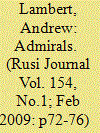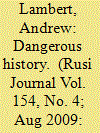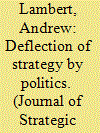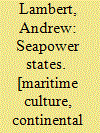|
|
|
Sort Order |
|
|
|
Items / Page
|
|
|
|
|
|
|
| Srl | Item |
| 1 |
ID:
086855


|
|
|
|
|
| Publication |
2009.
|
| Summary/Abstract |
Historically, the job of the admiral was to make high level decisions that affected the conduct of war, or the preservation of peace, far from home, and without access to the advice of kings or queens, statesmen and ministers. This article charts the necessary qualities and gifts of successful British admirals throughout the ages.
|
|
|
|
|
|
|
|
|
|
|
|
|
|
|
|
| 2 |
ID:
090532


|
|
|
|
|
| Publication |
2009.
|
| Summary/Abstract |
In 1845 British naval captain Sir John Franklin sailed into the Canadian Arctic with two ships and 128 men, and disappeared. His ill-fated expedition was swiftly mythologised and co-opted into a Victorian narrative of self-sacrifice, heroism and duty. In puncturing these myths, Professor Andrew Lambert, author of an acclaimed new history of Franklin's polar navigation, explains why history is not a fixed record, but a constantly evolving interaction between different ages, and different opinions.
|
|
|
|
|
|
|
|
|
|
|
|
|
|
|
|
| 3 |
ID:
181206


|
|
|
|
|
| Summary/Abstract |
For much of the past century discussions of British strategy between the 1880s and 1914 have been dominated by a tendency to focus on explaining what happened after August 1914, assuming the strategic thinking of British governments was in any way comparable to operational level focus of mass army operations directed at terrestrial borders and concluding that the Army had in some way ‘won’ the strategic debate, in 1911, or August 1914. This model derived considerable support from the post-war writings of Winston Churchill who, in the process of explaining his own controversial decisions, failed to reflect the reality of naval planning. The land focused, army-led model was contested between the wars, but once the British Army on the Rhine, on NATO’s ‘Central Front’, became the cornerstone of national policy it lent a curious validation to the idea that the military discussions of the pre-1914 Anglo-French Entente had represented a similar ‘commitment’. Furthermore NATO’s naval needs were restricted to the distinctly secondary ‘Flank’ or ‘Out of Area’ regions. These three important new books provide an opportunity to revisit the debate three decades after the end of the Cold War, when NATO has been operating as a global expeditionary force, rather than a conventional barrier shielding Western Europe.
|
|
|
|
|
|
|
|
|
|
|
|
|
|
|
|
| 4 |
ID:
175959


|
|
|
|
|
| Publication |
London, Yale University Press, 2018.
|
| Description |
xv, 399p.Pbk
|
| Standard Number |
9780300251487
|
|
|
|
|
|
|
|
|
|
|
|
Copies: C:1/I:0,R:0,Q:0
Circulation
| Accession# | Call# | Current Location | Status | Policy | Location |
| 059943 | 359/LAM 059943 | Main | On Shelf | General | |
|
|
|
|
|
|
|
|
|